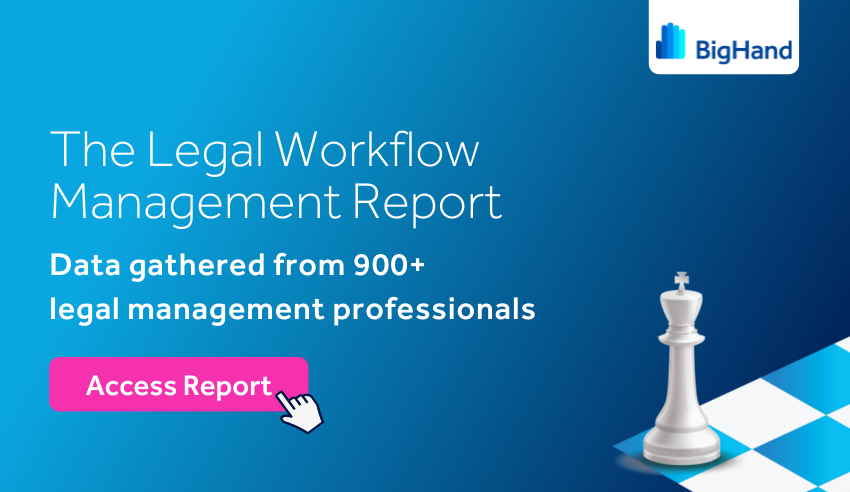Industry survey finds APAC firms support service modernisation lagging
Law firms in APAC are behind the curve when it comes to legal support service modernisation, results show from BigHand’s recent Legal Workflow Management survey findings.

Law firms in APAC are behind the curve when it comes to legal support service modernisation, results show from BigHand’s recent Legal Workflow Management survey findings. With over 900 responses across senior Operations, HR, Support Services, Resource Management and Practice Group Leaders, from firms in the UK, North America (NA) and APAC, the industry report offers an accurate view of the state of legal workflow management globally.
Over the past few years, law firms globally have recognized the need to create more efficient, productive and responsive support services. The pace of change was, in the main, gradual – until the past year. As the BigHand Legal Workflow Management survey reveals, one trend in firms’ responses to the COVID-19 pandemic has been to make very significant reductions in support staff numbers.
In APAC the reduction in support staff was less significant – with 32% confirming they have made permanent or temporary reductions, compared to 78% of NA firms and 70% of UK firms. This is most likely due to the lessened impact of the pandemic in the APAC region, but with other regions having prioritized changing support staff structures and processes around effective work allocation to accommodate the reduction in support staff, the question stands of whether APAC firms are now lagging behind.
In APAC almost two thirds (64%) confirm support staff are utilized the same, and only 4% confirm they have been used less. This is more than likely because fewer APAC firms had previously made any changes to the support structure. While fourth fifths of UK (81%) and NA firms (79%) had already restructured or introduced teams for support staff prior to the pandemic, just a quarter of APAC firms (25%) had made this change. During the past year fee earners with relationship-based secretarial support will simply have carried on as before, albeit remotely. Most firms who moved away from this type of support structure did so to improve efficiency/utilization which leads to the question of if it is perpetuating an underutilization problem that existed prior to moving to remote working.
The findings around billable hours would suggest so. Despite APAC firms reducing support staff less than other parts of the world, the relatively small amount of cutbacks have impacted billable hours. The BigHand research reveals 57% of respondents confirmed billable hours to have decreased or stayed the same. When considering these numbers, the question that should be considered is if billable hours are decreasing (or at best staying the same) how can firms maintain and grow profits?
To add to this, it would seem that APAC firms are also not prepared with transitioning to hybrid working with firms reporting that this was not a priority for all staff with APAC firms reporting only 4% of support staff expected to move to hybrid working. It could be presumed that this is due to the speedy ‘return to normal working’ after the first wave of the pandemic. At the same time, the APAC region had the highest scores for recognising the personal benefits for enabling hybrid working. This would indicate that individuals see the benefits of hybrid working but firms are not preparing to make this happen which in comparison to the other regions and other sectors appears that firms in APAC did not prioritise future-proofing their business models. With the current new lockdowns across Australia, there must be a challenge to law firm leaders to address this.
The good news is that that data shows that despite APAC firms not changing at the pace of other regions, change is on the agenda. Firms recognize the need to support this rapidly evolving support model, with over half of APAC firms (53%) planning to implement workflow technology over the next 24 months. The drive towards workflow technology and better information and reporting will play a key role in enabling the sector to build on the progress of the past year.
Other benefits of workflow technology will also help firms to successfully adapt and transition to hybrid working, such as a centralised view of task requests for increased transparency, rather than those tasks being hidden in individual inboxes. Tracking of task progress becomes automated, as well as workflows to ensure the right skilled resources are always sent the right work at the right cost to the business. The ability to centrally reallocate work to different resources to reduce bottlenecks of work, and ensure those working in the office, or at home, are given the most suitable tasks, will be critical.
Timing is key – firms in all sectors have managed the difficulties of the past year because individuals have pulled together and found ways to collaborate wherever possible. As hybrid working becomes business as usual, firms need to rapidly transition to an operational structure that provides consistent, efficient support to all lawyers and, thereby, clients – creating a legal support service that is truly fit for a post pandemic economy should be the number one priority.
Access the full Legal Workflow Management Report here: https://www2.bighand.com/lw-workflow-report
